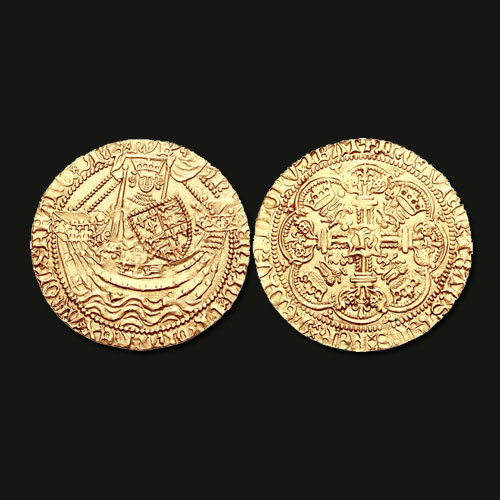Henry V crowned King of England
2020-04-09 Thu
Henry, also known as Henry of Monmouth was King of England reigning from 1413 until his death in 1422. Immortalized in Shakespeare's "Henriad" plays, Henry is known and celebrated as one of the greatest warrior kings of medieval England.Henry was born in the tower above the gatehouse of Monmouth Castle in Wales, and for that reason was sometimes called Henry of Monmouth. After Henry IV died on 20 March 1413, Henry V succeeded him and was crowned on 9 April 1413 at Westminster Abbey.
As the victor of the Battle of Agincourt (1415, in the Hundred Years’ War with France), he made England one of the strongest kingdoms in Europe. Henry V promoted the use of the English language in government.
His nine-year reign was extremely successful, and Henry V became a legend. Many coins were minted during those nine years, and quite a few survive. A gold noble struck during the reign of Henry V. The obverse depicts King standing in ship holding sword and shield quartered with arms of England and France. Mullet by sword arm, broken annulet on ship side. The reverse engraved Floriated cross with lis at ends, crowned lions between, h to center surrounded by tressure of eight arches. Quatrefoil in the second quarter.
Image Source: wikimedia.org
Latest News
-
Malwa Sultan Mahmud Shah Silver Coins
2025-09-11 ThuMalwa Sultan Mahmud Shah minted silver coins in round and square flans. <br><br> For round coins,...
-
Malwa Sultan Mahmud Shah Billon coin
2025-08-26 TueMalwa Sultan Mahmud Shah's billon coins followed three weight standards: 100 rati, 96 rati, and 80 r...
-
Fascinating Archaeological Facts on Postage Stamps - 91
2025-08-23 SatRhinoceros is one of the oldest land mammal species existing in India. There are five species of rhi...
-
Fascinating Archaeological Facts on Postage Stamps - 90
2025-08-23 SatUthiramerur, a Village in Kanchipuram, Tamil Nadu, is notable for its Temple inscriptions that descr...
-
Fascinating Archaeological Facts on Postage Stamps - 89
2025-08-21 ThuThe term “millet” is derived from the Latin word “milum,” which translates to grain. millets...

